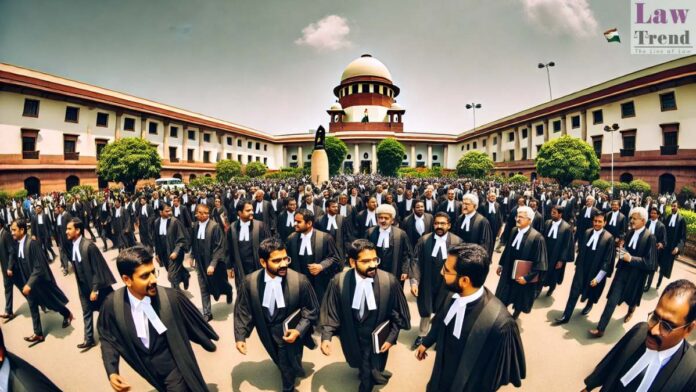In a significant directive aimed at streamlining the administration of legal bodies across the country, the Supreme Court on Tuesday established a rigid, nationwide timetable for conducting elections to State Bar Councils. Noting that polls in a majority of states have been languishing for years, the Apex Court has ordered that the election process for 17 State Bar Councils must be concluded in a phased manner between January and April 2026.
To ensure transparency and adherence to the schedule, the Court has removed the election process from the sole purview of local councils, placing it under the direct supervision of High-Powered Election Committees headed by retired judges.
Judicial Intervention to End Delays
A Bench comprising Justices Surya Kant, Ujjal Bhuyan, and NK Singh took stern note of the prolonged delays in constituting fresh bodies for state bar councils. Underscoring that no further extensions would be permitted, the Bench laid down a definitive roadmap, creating a “strict nationwide timetable.”
While the Court mandated elections for 17 states, it specifically excluded five State Bar Councils from this immediate schedule due to differing circumstances:
- Bihar: Elections have already concluded.
- Chhattisgarh: Counting is in progress and must be completed within a month.
- Odisha: Elections were recently held in 2023.
- Madhya Pradesh & Manipur: Terms have not yet expired (due in 2026 and 2027, respectively).
The Phased Election Schedule
The Supreme Court has categorized the 17 states into five specific phases to ensure logistical smooth functioning:
- Phase I (By January 31, 2026): Uttar Pradesh and Telangana.
- Phase II (By February 28, 2026): Andhra Pradesh, Delhi, Tripura, and Puducherry.
- Phase III (By March 15, 2026): Rajasthan, West Bengal, Jharkhand, Karnataka, Gujarat, and Punjab & Haryana.
- Phase IV (By March 31, 2026): Meghalaya and Maharashtra.
- Phase V (By April 30, 2026): Tamil Nadu, Kerala, and Assam.
Two-Tier Supervisory Mechanism
In a bid to insulate the election process from local influence and disputes, the Court directed the formation of a two-tier supervisory structure.
At the regional level, elections will be overseen by High-Powered Election Committees headed by retired High Court judges.
At the apex level, a National High-Powered Supervisory Committee will be constituted. This body will comprise a former Supreme Court judge, a former High Court Chief Justice, and a Senior Advocate who is not contesting any Bar Council elections. This national body will serve as the final authority on disputes; the Supreme Court has explicitly barred Civil Courts and High Courts from entertaining challenges to the decisions made by these committees.
Degree Verification vs. Election Timeline
A critical aspect of the hearing involved the verification of advocates’ law degrees—a process aimed at weeding out fake practitioners. The Bench clarified that while State Bar Councils are duty-bound to verify the genuineness of degrees, this exercise cannot be used as a pretext to stall the democratic process.
Comparing the verification process to “delimitation,” the Court ordered that it must run simultaneously with the election preparations. To facilitate this, law universities and departments have been directed to depute special teams, including senior faculty members, to verify degrees sent by State Bar Councils.
Crucially, the Court ruled that advocates who have applied for verification shall be allowed to vote, subject to the condition that they will face legal consequences if their degrees are later found to be fraudulent.
Procedural Roadmap
The Bench also prescribed a fixed timeline for the internal processes of the election to ensure momentum is not lost:
- Preparation/Publication of Electoral Rolls: 15 days (starting from November 20).
- Objections: 7 days.
- Filing Nominations: 7 days.
- Final List Publication: 1 day.
- Withdrawal: 3 days.
- Voting: 20 days allocated for the preferential-vote election.
The Bar Council of India assured the Court of its full cooperation in implementing these directions to ensure timely and transparent polls.




